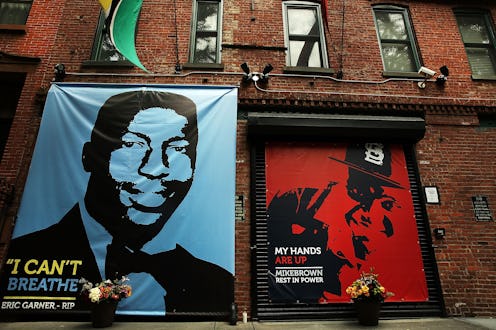News
Pantaleo Could Still Face Jail Time
He's been cleared of all criminal charges by the grand jury, but NYPD officer Daniel Pantaleo could still be punished for the death of Eric Garner. Hours after Pantaleo was acquitted, U.S. Attorney General Eric Holder announced that the Department of Justice will conduct a civil rights investigation into the death of Eric Garner. Pantaleo is also facing a civil lawsuit from Garner's family and an NYPD internal affairs investigation, the latter of which could end his law enforcement career. After Pantaleo being cleared renewed the nation's lingering anger from the Ferguson case, Americans will be watching closely to what happens to Pantaleo next.
On Wednesday night, following the grand jury's decision not to indict Pantaleo, Attorney General Holder launched a federal investigation into the death of Garner, who died after Pantaleo put him in a choke hold, to assess whether the NYPD had violated Garner's civil rights. The probe will be overseen by U.S. Attorney Loretta Lynch, who is the top prosecutor for the Eastern District of New York and who has extensive experience with police brutality cases. Lynch said in a statement on Wednesday:
Since the death of Eric Garner in July, our office has monitored this case closely.... As the Attorney General explained earlier tonight, because the local investigation has come to a close, the Justice Department will now move forward with its own independent inquiry to determine whether federal civil rights laws have been violated.
The federal investigation presents a few possible outcomes for Pantaleo, as do the civil suit from Garner's family and the NYPD's internal affairs investigation. Here's what could happen to Pantaleo next.
Federal Prosecution
Through the DoJ probe, federal prosecutors will pursue criminal civil rights charges and most likely try to prove that Pantaleo violated Section 1983, a statute that covers police misconduct. On the one hand, Garner's case will be easier to prosecute because of the existence of the recording and because misconduct is much easier to prove when it involves physical force instead of a shooting, which are often split-second decisions. Prosecutors will need to prove that the amount of force Pantaleo used was beyond what was necessary, which might not be too difficult since the choke hold is banned under NYPD policy for a reason.
On the other hand, according to New York criminal defense lawyers Patrick V. Parrotta and Joseph Sorrentino, the race element in civil rights violations can be tricky to prove. Parrotta told the Staten Island Advance:
They would have to be of the opinion that this entire incident from start to finish was motivated by race, and nothing else.
Sorrentino echoed his statement, saying:
There is no tangential evidence that they singled out Eric Garner because of his race.
Civil Lawsuit
Even if Pantaleo is cleared of civil rights violation charges, he and his department still face a civil lawsuit. In October, Garner's family filed the suit against the city, the NYPD, and six individual officers accusing them of wrongful death, assault, battery, intentional infliction of emotional distress, negligent supervision, and negligent training. The family's Notice of Claim stated:
Daniel Pantaleo...negligently and recklessly placed Eric Garner in a chokehold, a maneuver that was banned from use by the New York City Police Department.... The officers involved failed to properly report the use of the banned chokehold maneuver to superiors, so as to attempt to create a cover up.
Garner's family is seeking $75 million in damages.
Disciplinary Action From the NYPD
In addition to the federal investigation and the civil lawsuit, Pantaleo will also be subject to an internal affairs investigation within the NYPD. The officer, who is currently on desk duty without access to his gun or badge, could be charged internally for using excessive force. The department would then hold a trial and the Department Advocate's office would make recommendations on the level of punishment — from discipline to job termination. However, the ultimate decision lies with NYPD Commissioner Bill Bratton.
Images: Getty Images (3)
